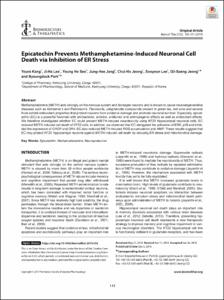Epicatechin Prevents Methamphetamine-Induced Neuronal Cell Death via Inhibition of ER Stress
- Keimyung Author(s)
- Jang, Jung Hee
- Department
- Dept. of Pharmacology (약리학)
- Journal Title
- Biomolecules & Therapeutics
- Issued Date
- 2019
- Volume
- 27
- Issue
- 2
- Keyword
- Epicatechin; Methamphetamine; Neuroprotection
- Abstract
- Methamphetamine (METH) acts strongly on the nervous system and damages neurons and is known to cause neurodegenerative diseases such as Alzheimer’s and Parkinson’s. Flavonoids, polyphenolic compounds present in green tea, red wine and several fruits exhibit antioxidant properties that protect neurons from oxidative damage and promote neuronal survival. Especially, epicatechin (EC) is a powerful flavonoid with antibacterial, antiviral, antitumor and antimutagenic effects as well as antioxidant effects. We therefore investigated whether EC could prevent METH-induced neurotoxicity using HT22 hippocampal neuronal cells. EC reduced METH-induced cell death of HT22 cells. In addition, we observed that EC abrogated the activation of ERK, p38 and inhibited the expression of CHOP and DR4. EC also reduced METH-induced ROS accumulation and MMP. These results suggest that EC may protect HT22 hippocampal neurons against METH-induced cell death by reducing ER stress and mitochondrial damage.
- Keimyung Author(s)(Kor)
- 장정희
- Publisher
- School of Medicine (의과대학)
- Citation
- Youra Kang et al. (2019). Epicatechin Prevents Methamphetamine-Induced Neuronal Cell Death via Inhibition of ER Stress. Biomolecules & Therapeutics, 27(2), 145–151. doi: 10.4062/biomolther.2018.092
- Type
- Article
- ISSN
- 2005-4483
- Source
- http://www.biomolther.org/journal/view.html?uid=1066&vmd=Full
- Appears in Collections:
- 1. School of Medicine (의과대학) > Dept. of Pharmacology (약리학)
- 파일 목록
-
-
Download
 oak-2019-0210.pdf
기타 데이터 / 673.72 kB / Adobe PDF
oak-2019-0210.pdf
기타 데이터 / 673.72 kB / Adobe PDF
-
Items in Repository are protected by copyright, with all rights reserved, unless otherwise indicated.